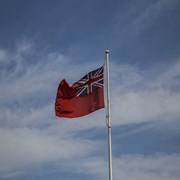
Sunday 24 Oct 2021
MORE BOATS TO FLY THE UNION JACK AS CHANCELLOR LOOKS TO BRING MORE INTERNATIONAL SHIPPING FIRMS ONSHORE
- Shipping industry tax system set for major post-Brexit overhaul – bringing more of the world’s biggest fleets to UK shores
- From April 2022 flying the UK flag will give global shipping companies more chance to be accepted when applying to join the UK’s Tonnage Tax Regime
- Shipping companies investing in net-zero will benefit now the UK is an independent free-trading nation
Landmark Post-Brexit tax changes to attract more of the world’s largest shipping companies to UK shores are expected to be announced at next week’s Budget and Spending Review.
The plans, to be unveiled by the Chancellor on Wednesday, are the first shake up the rules have had in over two decades, and mean that from April 2022, ships that fly the Union Jack and those who help the UK reach net-zero will both be more likely to be accepted if applying to the UK’s tonnage tax regime.
Whilst the UK was part of the EU, many companies who were part of, and therefore benefitting from, our regime, had to abide by rules which meant there was no recognition of the difference between a ship flying the Union Jack and other flags from EU countries.
Now the UK is an independent free-trading nation, this rule no longer applies, with a clear steer from the Chancellor that ships flying the UK Red Ensign - a red flag with the Union Jack in the upper left hoist – will be more likely to be able to participate in the UK’s Tonnage Tax regime.
Rishi Sunak said:
“The UK has always been a proud and pre-eminent maritime nation, with 95% of our trade in goods carried out by sea.
“Now we have left the EU, it’s time for us to do even more to help the UK shipping industry to grow and compete in the global market.”
Tonnage tax regimes help countries attract shipping companies to their jurisdictions through offering competitive tax rates.
When a shipping business participates in the UK’s regime, they can pay less tax by paying based on the amount they can carry, rather than the profits they make. Global competition has ramped up over recent years, as more countries developed their own regimes, with each one offering different benefits for the firms who they can attract. The more firms within the UK regime, the greater the gain for the UK’s economy, with the shipping sector supporting more than 670,000 jobs in coastal communities.
The flag a ship chooses is important as it represents a company’s commitment to following the laws and regulations of where it’s registered. With the UK internationally revered for its high standards in these areas, from next year HMRC will therefore consider in applications ships flying the UK flag as an important factor.
Rules regarding the type of boats that could qualify are also going to expand to reflect the UK’s net zero ambitions and global leadership in science and tech. This includes ships that lay cables to help create wind farms and scientific research vessels. Companies that bring value to the UK, by investing in decarbonisation will also be more likely to be accepted if they apply to the UK’s regime.
If they choose the UK, cruise companies too will benefit, as they will no longer have to audit their finances after every voyage they embark on, to cut down their admin burden.
Gavin Simmonds, Policy Director Commercial at the UK Chamber of Shipping said:
“The Chamber congratulates the Chancellor on responding to the needs of our industry and we welcome this package which will immediately strengthen the UK Flag shipping, encourage innovation in the offshore energy sector and attract international investment. It will be important to maintain positive momentum and deliver improvements to the training commitment and to find ways of opening the regime to other shipping businesses in the next year.”
ENDS
Further info
- The UK’s tonnage tax was introduced in 2000.
- A 2015 report by the Centre for Economics and Business Research sets out (in its central scenario) that the UK shipping industry would have directly contributed 73% less GVA (£3.1 billion) during 2015 without the Tonnage Tax regime, and there would be 37,000 fewer jobs (so 13,700 in total). Once indirect and induced impacts are considered, without the Tonnage Tax regime, only a total of 223,300 jobs would have been supported by the shipping industry across the UK economy in 2015, in comparison to the outturn of 674,400 jobs.
- View the latest photos from HMT at our Flickr
- Picture of flag:
Contact Information
HMT Press Office
020 7270 5238
pressoffice@hmtreasury.gov.uk
Follow us on Flickr to download the latest photos from HM Treasury: https://www.flickr.com/photos/hmtreasury/


